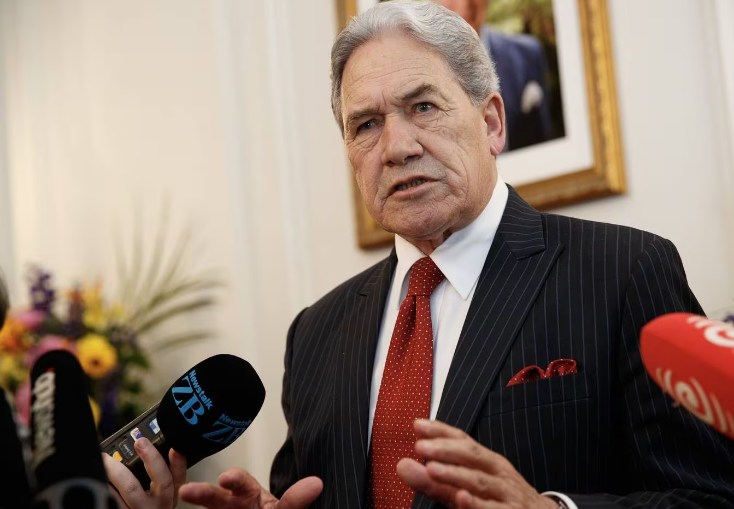Freshly-minted Deputy Prime Minister Winston Peters has engaged in a testy first news conference in the role in which he offered his definition of “woke virtue signalling” and invoked the late Māori land rights activist Dame Whina Cooper in defending his approach to the Treaty of Waitangi.
The veteran politician and NZ First leader was officially sworn into the role this morning, which he will hold first in a novel timeshare arrangement with Act’s David Seymour of 18 months each as part of the new coalition government with National and Act.
It is his third time as deputy PM - the first was under a National-led government between 1996 and 1998 and then under Labour from 2017 to 2020.
Speaking shortly after the ceremony at Government House in Wellington, Peters said it was a time for “immense gratitude” for NZ First supporters as there were many people who thought the party, booted out of Parliament in 2020, wouldn’t make it back.
It wasn’t long before the tone shifted as Peters first objected to being to ask move closer to the microphones, before at several points throughout the press conference attacking the journalists and their organisations rather than answering the questions themselves.

“They’ll be based on thing called equality,” he said, before referencing Cooper and her Land March in 1975 that he said he was involved in.
“She said in 1990 that we signed the Treaty so that we could have a country where everybody was equal. That’s always going to be the Treaty.”
Peters was also asked about the agreement struck between New Zealand First and National that included requiring public service departments “have their primary name in English, except for those specifically related to Māori”.
It also included a requirement that “public service departments and Crown entities... communicate primarily in English”.
Asked if that would extend to the national museum, Te Papa, he said it wouldn’t as it’s a “museum with a historic name”.
He was then asked about his numerous comments to “end woke virtue signalling in policies”, and provide a definition.
The term might be new, but as The New Zealand Herald recently reported Peters has a long history of bucking against what he now calls “woke virtue signalling”.
Back in the 2000s, he said journalists questioning his use of the phrase “two Wongs don’t make a white” were the self-appointed “Nazi politically correct police.”
“Woke means like a lot of you, you woke up yesterday thinking you know a lot more than the rest of us, and got a greater sense of consciousness about these issues,” Peters said today.
On Māori issues, he said like himself many campaigning now were “never there at the start”.
“Never known what it was like to fight against former governments, bring land cases, and go to the wire without funding to make sure win and after 16 years finally win.
“And to see somebody like Whina Cooper at one of those protests saying... I am going to have a Māori land march. I was at the beginning of all those things based on the law, not some new fangled view of the Treaty of Waitangi.”
Peters indeed first made a name for himself acting on behalf of his iwi, Ngāti Wai, successfully battling a plan in the 1970s to turn its coastal land into public reserves.
Peters, who will also be Foreign Minister, said he was getting a briefing today on the portfolio but intended to travel much more than under the previous government, with a strong focus on the Pacific.
“It’s rather sad that because of the way the election shaped up, we didn’t make the Pacific Islands Forum this year.
“But these areas are critical to our country’s future. And so I have got to make sure first of all, I have got the budget secured, all commitments going forward secured. And I’m having a briefing this afternoon to find out where we are.”












